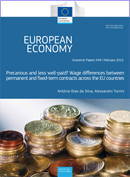|
|
|
|
|
|
|
|
|
|

|

|

|

|
Investment Plan: Green light for SME financing before the summer
Small and medium-sized companies (SMEs) across Europe should benefit from the first funds from the planned European Fund for Strategic Investments (EFSI) before the summer, the European Investment Bank (EIB) announced on 17 February. The money can be made available to SMEs by the European Investment Fund (EIF), which is part of the EIB-Group. The funds are to cover the risk of transactions with intermediaries that provide additional finance to SMEs and small mid-caps until the EFSI is in place. The EFSI – which is at the heart of the Investment Plan – is intended to be active in a broad range of areas, including transport, energy and broadband infrastructure, education, health, research and risk finance for SMEs and should be up and running by September 2015 at the latest. Infrastructure projects may also benefit from similar pre-financing arrangements before the EFSI is fully set up.
|

|

|

|
|

|

|

|

|

|
|

|

|

|
|
By the summer, cash-starved SMEs and innovative mid-caps across Europe could be benefitting from an injection of badly-needed capital. We have said that we want to help get Europe investing again - and today we are doing exactly that.
|

|
Jyrki Katainen, Vice-President for Jobs, Growth, Investment and Competitiveness
|
|
|
|

|

|
 |

|
G20 Ministers focus on growth and investment
Commissioner Moscovici participated in the first G20 Ministerial meeting of the Turkish G20 Presidency on 9-10 February in Istanbul. Discussions focused on the global economic outlook, G20 growth strategies, investment, financial regulation, taxes and reform of the International Monetary Fund. Ministers agreed to monitor the implementation of growth strategies, focusing on commitments that have the greatest impact on growth in order to achieve the collective ambition of adding 2% to global GDP growth by 2018. Ministers also committed themselves to boosting investment through country-specific investment strategies in order to help achieve the above ambition. Progress was also made on financial regulation and taxes including Base Erosion and Profit Shifting (BEPS).
|

|
|

|

|
|

|

|

|

|
EU disburses EUR 100 million in macro-financial assistance to Jordan
On 10 February, the European Commission, on behalf of the EU, disbursed EUR 100 million to Jordan in the form of loans. This is the first tranche of the Macro-Financial Assistance programme for Jordan, which amounts to EUR 180 million in total. This assistance comes in addition to other forms of EU assistance and specifically to more than EUR 300 million already provided to Jordan since the beginning of the Syrian crisis in order to address humanitarian, development and security needs. The Commission continues to assist the government of Jordan in its on-going reform efforts in key sectors, ranging from renewable energy and energy efficiency to employment and private sector development. Disbursement of the second tranche of the assistance, amounting to EUR 80 million in the form of loans, is planned for mid-2015.
|

|
|

|

|
|

|

|

|

|
Unlocking funding for Europe's growth: Commission consults on Capital Markets Union
The European Commission has launched a landmark project to unlock funding for Europe’s businesses for the long term and to boost growth in the EU’s 28 Member States through the creation of a true single market for capital. On 18 February, the Commission launched a three-month consultation on a Green Paper, the outcome of which will shape an Action Plan to help establish the Capital Markets Union (CMU). The CMU will break down the barriers that are blocking cross-border investments in the EU and preventing businesses from getting access to finance. A major aim is to unlock non-bank funding so that start-ups can thrive and larger companies can expand further. The current environment is tough for businesses that remain heavily reliant on banks and relatively less on capital markets. The opposite is true in other parts of the world. If EU venture capital markets were as deep as they are in the US, for example, as much as EUR 90 billion more in funds would have been available to companies between 2008 and 2013.
|

|
|

|

|
|

|

|

|

|
EU Council backs European Commission proposal to fight against the manipulation of financial benchmarks
The EU has taken a further step towards restoring public trust in financial benchmarks in the wake of recent scandals over the manipulation of the LIBOR (London interbank offered rate) and EURIBOR (Euro Interbank Offered Rate) benchmarks. In a move announced on 13 February and welcomed by the European Commission, the Council has given its backing to proposed rules that will enhance the robustness and reliability of benchmarks, which are used in financial instruments (e.g. bonds, shares, futures or swaps) and financial contracts (e.g. mortgages or consumer contracts) in the EU. The new rules were proposed by the Commission in September 2013 after it emerged that some benchmarks had been manipulated, resulting in multi-million euro fines for several banks in Europe and in the US.
|

|
|

|

|
|

|

|

|

|
8th round of trade negotiations: EU and US table proposals on regulatory cooperation and technical barriers to trade
EU and US officials completed the 8th round of weeklong negotiations in Brussels for the Transatlantic Trade and Investment Partnership (TTIP) on 5 February. During negotiations on the new EU-US trade and investment pact, the two sides discussed market access, tariffs, services and public procurement, as well as both horizontal and sector-specific regulatory issues. Each side tabled their proposals on regulatory cooperation, technical barriers to trade (standards and conformity assessment), food safety, and animal and plant health. The EU’s proposal on regulatory cooperation emphasised the importance of good regulatory practices such as impact assessment and stakeholder consultations, as well as establishing a good system for cooperation between US and EU regulators. In its ongoing effort to make negotiations on the TTIP more transparent, the Commission has published the full EU proposal on regulatory cooperation, along with a fact sheet and a detailed explanatory document.
|

|
|

|

|
|

|

|

|

|
New from Eurostat: First time release of data on contingent liabilities and non-performing loans in EU Member States
Eurostat, the statistical office of the EU, has published, for the first time ever, information on the contingent liabilities and non-performing loans of Member State governments. The information released on 10 February was provided by EU Member States in the context of the Enhanced Economic Governance package (Directive 2011/85/EU Article 14). The contingent liabilities identified in this new data collection include government guarantees, off-balance sheet liabilities related to public-private partnerships, and the liabilities of government controlled entities classified outside general government such as public corporations. The liabilities are called “contingent” in the sense that they are by nature only potential and not actual liabilities. By giving a more comprehensive picture of EU Member States’ financial positions, this new data collection represents a step towards the fuller transparency of public finances in the EU.
|

|
|

|

|
|
|
|
|
|

|

|

|

|
Precarious and less well-paid? Wage differences between permanent and fixed-term contracts across the EU countries. European Economy. Economic Papers 544.
This paper analyses wage differences between permanent and fixed-term workers and the factors that are driving these differences, including the role of labour market institutions. The paper is based on data from the European Structure of Earnings Survey. It finds that after controlling for individual and job characteristics, workers on permanent contracts earn an average of about 15% more than workers on fixed-term contracts with similar observable characteristics. The wage premium for workers on permanent contracts is higher for men, middle-aged workers and for workers with a moderate level of education who perform non-menial tasks. The paper also finds that permanent workers enjoy a higher education- and age-related wage premium. The results indicate that the high wage premium for workers on permanent contracts is linked to high levels of employment protection for such workers, a high share of temporary employment in the economy, lengthy periods of unemployment benefit entitlement, and low minimum wages.
|

|
|

|
|
|
|
|
|

|

|
How the euro's depreciation is affecting the EU economy
|

|

|

|

|

|
Measured against a weighted basket of currencies, the euro's "Nominal Effective Exchange Rate" (NNER) has depreciated by about 5% since its peak in March 2014. The euro is now trading close to its long term average.
|

|

|
|
|
|
|
|
|
|
|
|
|
|
|
|
|
|
|
|

|
|
Directorate-General for Economic and Financial Affairs
|

|
|